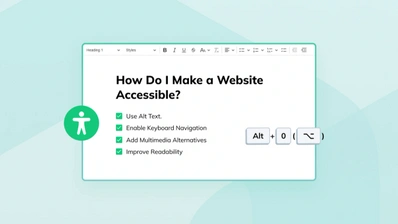Accessibility, usability and SEO go hand in hand

David Carralon is a marketing professional based in Paris. He currently works as the Head of International SEO for Career Builder. In his spare time he writes about Search Engine Marketing on his blog and tweets about “all things digital marketing” at @DavidCarralon.
In this brief talk, we are looking at how web accessibility and search engine optimization are closely connected. Read on for more!
David, what similar issues stand in front of a user who has certain disabilities (either physical or technical) and Googlebot when exploring the web?
The similar main issue I can think of is navigation. Search engine bots have to be treated like disabled users. There are no other user agents more disabled than them.
If the website is badly designed to the point where users struggle to comprehend the website and/or get a feeling of control, the chances are that the search engine bots will struggle too. Worst case scenario is that certain key parts of your website are never being found nor acknowledged by search engines. Insufficient or incomplete crawling would lead to loss of relevant traffic and, eventually, leads.
In your blog post about search ranking factors you mention, that "accessible sites leading to a great architecture" are amongst the top 3 search engine ranking factors, that influence high ranking in organic search results. We are all aware that web accessibility is about providing equal opportunity for people with disabilities surfing the web, but what about the “great architecture” part. Could you elaborate?
I think there are two parts to the answer: the first one is to clarify that web accessibility is not just to create a comfortable environment for people with disabilities but for all users. It’s about ensuring that all parts of the website can be navigated easily, that interaction happens naturally and that all users understand the website without having to spend hours studying it.
The second question is how web accessibility influences website architecture. I assume that you mean both information architecture (IA) and technical architecture. Good web accessibility is about ensuring that the site is organized in a meaningful and logical manner, in order to help users with the task of navigation and comprehension. IA is a tool or technique that can help achieve that goal. In addition to that, the technical platform needs to be made accessible to both users and search engine bots. So things like navigation, labeling, shallow vs deep website structure are often key to effective content findability and discovery, particularly when it comes to indexation of large websites. Web accessibility does clearly influence website architecture by demanding standards-compliant techniques (HTML sitemaps, HTML5 vs jQuery, not using Javascript for navigation, etc.)
Citing after Google's Accessibility pages: "Google actively promotes an accessible web by serving on standards and advisory committees." Is there any strong evidence that Google favours sites that have implemented the latest Accessibility Standards (WCAG, Section 508, WAI-ARIA Suite) or we can only hope that these standards improve organic search rankings?
I don't think that Google would simply prefer one site to another just because it meets all web accessibility standards. However, Google may use many of the signals deriving from implementing good web accessibility standards when assessing a site’s suitability or eligibility to rank for certain terms. They look at over 200 ranking factors before they decide what position a page should rank on. Many of those are likely to be directly influenced or dictated by having good website accessibility. Therefore adopting accessibility-compliant CMS solutions for enterprise use, is always going to help improve SEO. A good example is the CKEditor with Accessibility Checker that you guys have built which allows you to inspect the levels of accessibility of a given piece of content. Accessibility, usability and SEO always go hand in hand to provide overall good user experience, both for standard users and disabled ones.
Is there such a thing as overdoing with SEO and (in turn) affecting accessibility of a website?
Over-optimisation and Spam SEO can both adversely affect web accessibility for sure. For example, over-optimisation of meta tags can lead to ambiguous understanding of the different pieces of content on a website, particularly for someone using a screen reader. So yes, I believe that overdoing SEO or spamming on-page meta tags and content can negatively impact website's accessibility.
The site needs to be designed, optimised and developed with the user in mind in the first place. Even when SEO is a big part of the designing process, one should still take the interest of the user into account for all recommendations and decisions made. Only then accessibility can be preserved.
Are there any SEM techniques that can reduce page accessibility?
Yes, I’m sure there are. For example, landing pages used for paid advertising campaigns aiming at user conversion are often free from navigation aid. An impaired user landing on such page would have a difficult job figuring out that it is just a campaign landing page and that in order to access the actual website of the company they need to move onto the root level domain. Not an easy topic as marketers do want these pages while internal UX teams may not.
If you could pick 5 essential things to improve in an online service that cover both web accessibility and SEO best practice, what would that be?
- Semantic Markup (descriptive & hierarchical headings, page titles etc.)
- Descriptive Link text (anchor text)
- Image optimisation (both in caption and alt tag)
- Recommendations to make the site architecture crawlable
- Writing short, concise and memorable urls
If you worked for a large corporate company, how would you sell accessibility to your boss?
It depends on which country we are in. If it's in the United Kingdom or France, I could use the argument that web accessibility standards are regulated by law and need to be adhered to. Therefore, I would bring up the legal aspects of having to adopt it.
In another context I would also add info about implications for the user experience, for company's marketing goals and overall for the sites ability to monetize its users. I could also explain the correlation between improving accessibility and crawlability and better search engine rankings.
Lastly, I would run a full accessibility audit of the website and bring up the top points for company’s consideration explaining how each of them may be affecting accessibility, and SEO.
Wikipedia mentions Google being "the most-used search engine on the World Wide Web, handling more than three billion searches each day. As of February 2015 it is the most used search engine in the US with 64.5% market share." What's your experience with other search engines in terms of accessibility and SEO?
Based on my own experience so far, I’d say that all main search engines out there are currently using sophisticated crawling infrastructure to discover and understand websites (with perhaps Naver the least sophisticated and more focused on paid listings rather than organic). Generally speaking all mainstream search engines out there use crawling technology that relies heavily on websites being accessible in order to find and discover content that they can index and use on their results pages.
Any other comments/thoughts around SEO and accessibility?
To anyone who wants to learn more about web accessibility I would recommend them , in the first place, to browse the official W3C WAI website and the tools recommended by the W3 consortium. Browser-based accessibility toolbars are also worth exploring.
You can read more on the topic of Web Accessibility in The Technology We Use Shouldn’t Limit Us from Finding a Connection, 5 Tips on How to Improve Accessibility When Creating Your Web Content in a WYSIWYG Editor, Commercial Benefits of Accessibility and If You're not Thinking About Accessibility - a Talk with Marcy Sutton blog posts.
In order to save your time and make sure that you implement proper accessibility standards on your website, we have created the Accessibility Checker - the first tool that enables you to check your content for accessibility issues and fix them before you go live.
It is built upon three key elements:
- User interface optimized for quick problem solving
- Flexibility allowing you to use the accessibility checking engine of your choice
- Quick Fix feature allowing you to eliminate common problems fully automatically


